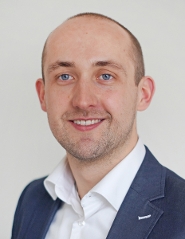
Dick Stufkens Prize 2017 awarded to chemist Sven Askes
The Dick Stufkens Prize 2017 for the best PhD thesis of the Holland Research School of Molecular Chemistry (HRSMC) is awarded to Dr Sven Askes. In his thesis "Upconverting Nanovesicles for the Activation of Ruthenium Anti-Cancer Prodrugs with Red Light", Askes describes a clever combination of materials and techniques for a new approach in photochemical cancer therapy.

In the development of successful and safe cancer treatments the focus increasingly is on the selective and localized administration of anti-cancer drugs. The research of Sven Askes has opened a new path towards such administration using a new concept of photochemical cancer therapy. The basic idea here is to use relatively harmless compounds that can be brought safely into the patient's blood stream without harmful side effects. At the site of the tumour these so-called prodrugs are subsequently converted into powerful anti-cancer drugs through irradiation with light.
Upconversion
The activation of ruthenium-polypyridyl prodrugs, however, requires the use of blue light. This poses a serious limitation since blue light does not penetrate very deeply in living tissue. The solution sought by Sven Askes was to irradiate with red light – known to penetrate quite well – and to convert the red light into blue light at the tumour location.
To realise this 'upconversion' of light he employed the interplay of functional dye molecules capable of so-called 'triplet-triplet annihilation (TTUC)'. Askes successfully devised nano sized supramolecular constructs (using liposomes and polymersomes) combining the upconverting dye molecules and the prodrugs to make sure the blue light indeed activates the prodrugs. Even so the omnipresence of oxygen turned out to seriously interfere with the upconversion efficiency. This problem was solved using biocompatible antioxidants such as ascorbic acid (vitamin C).
In his research Sven Askes focussed on new prodrugs of the ruthenium-polypyridyl type. After activation with light these are able to induce cell death through a variety of bioselective mechanisms. In contrast to the well-known photodynamic therapy (PDT), which generates rather nonselective reactive oxygen species, ruthenium-polypyridyl prodrugs do not require the presence of oxygen. They can thus be used for the treatment of oxygen poor tumours not affected by PDT.
Intelligence and perseverance
According to the jury of the Dick Stufkens Prize 2017 Sven Askes has with intelligence and perseverance overcome many of the hurdles hampering the development of the new photochemotherapy approach. In doing so he has mastered and applied a wide variety of chemical, spectroscopic, microscopic and biochemical techniques and produced an impressive number of publications in high-ranked journals that also document his extensive collaborations with other researchers.
The jury is impressed by the quality, the originality and the interdisciplinary character of Sven Askes’s PhD thesis and expects that the work will have considerable impact on future development of photochemical cancer therapy.
Sven Askes performed his research at the University of Leiden in the Institute of Chemistry. He defended his thesis on 24 November 2016 at Leiden University (promotor Prof. Lies Bouwman, co-promotor Dr. Sylvestre Bonnet). Askes is now a postdoc researcher at the Nanoscale Solar Cells group at AMOLF.
The Dick Stufkens Prize is awarded annually to the best thesis defended in the period July 1 to July 1 of the next year by a PhD student belonging to the Holland Research School of Molecular Chemistry (HRSMC). The prize – first awarded in 2008 - consists of a certificate and an amount of 1000 euro.
On 16 November Prof. Jan Verhoeven will present the Dick Stufkens Prize 2017 to Sven Askes during the annual HRSMC symposium. This year the symposium will be organized at the Amsterdam Science Park Congress Centre. Apart from Sven Askes, who will give a lecture on his PhD research, various HRSMC PhD students and staff members will present lectures and posters. A guest lecture will be given by Spinoza laureate Prof. René Janssen (Eindhoven University of Technology).The symposium is open for non-HRSMC members. For further information and registration consult the HRSMC website.
About the HRSMC
The Holland Research School of Molecular Chemistry was founded in 1994 and has been accredited by the Royal Academy of Arts and Sciences (KNAW). The research school combines experimental and theoretical groups working on molecular chemistry and physics from the Universiteit van Amsterdam, the Vrije Universiteit Amsterdam and the Universiteit Leiden. Apart from creating the appropriate conditions for further collaboration between the participating groups, the school also provides an internationally highly acclaimed teaching program for PhD students. Prof. Dick Stufkens†, scientific director during the 1997-2001 period, has been one of the driving forces behind the HRSMC. His efforts have, amongst others, contributed significantly to the international reputation of the HRSMC.
